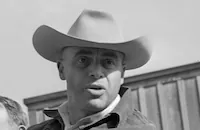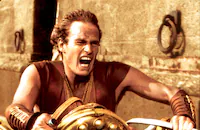Will Penny
Brief Synopsis
Cast & Crew
Tom Gries
Charlton Heston
Joan Hackett
Donald Pleasence
Lee Majors
Bruce Dern
Film Details
Technical Specs

Synopsis
Will Penny, a middle-aged cowpuncher who has always been a loner, joins two younger men, Dutchy and Blue, in search of winter work after completing a long cattle drive in Montana in the 1880's. While hunting deer, the three men are attacked by the maniacal Preacher Quint and his three sons; in the ensuing gunfight Will kills one of the sons. Quint and his other two sons, Rafe and Rufus, ride off swearing vengeance on the cowboy. As soon as a doctor is found for the injured Dutchy, Will sets out on his own, gets a job as rider for a large ranch, and heads for a mountain shack to spend the winter. In the cabin he finds Catherine Allen, en route with her 10-year-old son, Horace, to join her husband in California. Obeying orders to evict squatters, he gives them 3 days to move. But when Will is ambushed by Quint and his sons, Catherine nurses him back to health; and in return he allows her to remain at the cabin with her son. The growing warmth between Will and Catherine is disrupted by Quint and his sons, who take Will prisoner and threaten Catherine with sexual assault. Will escapes, meets up with Blue and Dutchy, and with their help kills Quint and wounds his sons. Catherine wants to settle down with Will and help build a ranch, but Will realizes that he will always be a loner and rides off with Blue and Dutchy.

Director

Tom Gries
Cast

Charlton Heston

Joan Hackett

Donald Pleasence
Lee Majors

Bruce Dern

Ben Johnson

Slim Pickens
Clifton James

Anthony Zerbe
Roy Jenson
G. D. Spradlin
Quentin Dean
William Schallert
Lydia Clarke
Robert Luster
Dal Jenkins

Matt Clark
Luke Askew
Anthony Costello
Gene Rutherford
Chanin Hale
Stephen Edwards
Crew
John A. Anderson
Roland Anderson
Lucien Ballard
Robert R. Benton
Charles Blackman
John Carter
Kenneth Deland
Fred Engel
Fred Engel
Tom Gries
Tom Gries
Paul K. Lerpae
Warren Low
Nellie Manley
Daniel J. Mccauley
Hedvig Mjorud
Ray Moyer
Hal Pereira
David Raksin
David Raksin
Ruby Raksin
Walter Seltzer
Walter Seltzer
Ruth Stella
Nathan Van Cleave
Robert Wells
Wally Westmore
Jack Wheeler
John Wilkinson

Videos
Movie Clip




Trailer
Film Details
Technical Specs

Articles
Will Penny
So the best bet is to praise all three of these artists, along with composer David Raksin, whose mood-setting music has the energy and edginess that were his trademarks. Together they made this mostly conventional western as enjoyable as any of its period. It was also something of a trailblazer, since its realism helped spark a trend that revitalized the genre during the 1970s, '80s, and '90s, from The Wild Bunch to Clint Eastwood's admired Unforgiven (1992), where hero William Munny's kids are named Will and Penny.
Gries developed Will Penny from an episode he'd written for Sam Peckinpah's television series The Westerner in 1960. The title character is an aging cowpoke (back then you got called Grandpa if you were over fifty) who finds himself out of work after giving up a job to a younger cowpoke who needs it more. Riding north with friends, he gets tangled in a quarrel with a religious fanatic called Preacher Quint, resulting in a shootout that kills one of the preacher's sons. A peaceable man at heart, Will continues his journey and finds employment as watchman on an enormous ranch, responsible for keeping travelers from stopping or squatting on the place. But no sooner does he start "riding the line" than trouble comes his way. When he gets to the cabin where he'll be living, he finds a young woman and her little boy living there. And far worse, Preacher Quint tracks him down, getting the drop on him and inflicting serious injuries.
The woman tends Will's wounds, so he decides to let her and the child stay on for the harsh winter that's about to hit. As time passes he feels more and more affectionate toward them, but it's unlikely they'll live happily ever after. Preacher Quint is still skulking around, and Will's boss is going to be mighty angry when he finds his new employee squatting with the very squatters he's supposed to chase away. Sure enough, the ending puts a bittersweet twist on the old convention of cowboy and cowgirl riding into the sunset. This was risky, as Heston candidly observed when he wrote In the Arena, his autobiography. He recalled people saying to him, "That's maybe the best movie you ever made, Chuck, but if you'd taken the girl with you at the end, it would've made a ton of money, too."
The actor also wrote candidly about director Gries, calling him "a gifted, mercurial, oddly unpredictable and somewhat childlike man" who was not "a good captain, which a great director must be" but rose to the occasion when he had "the right material." Will Penny was terrific material, and Heston regarded it as one of the best films he ever appeared in. It was also his personal favorite, thanks partly to its themes-loyalty, fatherhood, the challenges of aging-and partly to the enthusiastic reviews it brought him, which were arguably the best of his entire career. The rest of the cast is also impressive: Joan Hackett as the woman in Will's life, Gries's eight-year-old son Jon Francis as her child, the great British actor Donald Pleasence as the evil preacher, Bruce Dern as his craziest son, Anthony Zerbe and Lee Majors as Will's best buddies, Slim Pickens as another cowpoke, Ben Johnson as the straight-shooting ranch foreman, Clifton James as a greedy saloon keeper, and William Schallert as a doctor who sees all cattlemen as irresponsible children at heart.
Will Penny was a fairly modest production, with Heston's big-star salary the largest single expense. Things didn't always go smoothly-both Lee Remick and Eva Marie Saint turned down the role that Hackett eventually accepted-but there were few major problems. In the end, however, the movie earned only $1.3 million at the box office. Along with its downbeat finale, Heston blamed apathy by a new management team at Paramount Pictures, who "more or less buried the release of films made under the previous regime, preferring to press forward with their own plans." And it didn't help that Heston was competing with himself-in his legendary science-fiction adventure Planet of the Apes, which was released just a week earlier. Will Penny had healthy TV, home-video, and cable revenues in later years, though, and its reputation is still rising.
Ballard photographed all kinds of films during a career lasting half a century, and if a large number of westerns show up on the list of his most respected pictures, one reason is that he shot important ones for such gifted directors as Sam Peckinpah, the great Budd Boetticher, and Henry Hathaway, not to mention the ungifted Howard Hughes, who hired Ballard as second-unit cinematographer of The Outlaw, his 1943 ode to Jane Russell's cleavage. Variety praised Will Penny for its "topnotch technical crew headed by Lucien Ballard with his color cameras," and even with movies like Buchanan Rides Alone (1958) and Ride the High Country (1962) and True Grit (1969) to his credit, it's safe to say Ballard never shot a more visually evocative western. In a movie where atmosphere really counts-the sprawl of the ranch, the mountains in the distance, the chill of the winter-his contribution is a key reason for its success.
Producers: Fred Engel, Walter Seltzer
Director: Tom Gries
Screenplay: Tom Gries
Cinematography: Lucien Ballard
Film editing: Warren Low
Art direction: Roland Anderson, Hal Pereira
Music: David Raksin
Cast: Charlton Heston (Will Penny), Joan Hackett (Catherine Allen), Donald Pleasence (Preacher Quint), Lee Majors (Blue), Bruce Dern (Rafe Quint), Ben Johnson (Alex), Slim Pickens (Ike Walterstein), Clifton James (Catron), Anthony Zerbe (Dutchy), Roy Jenson (Boetius Sullivan), G.D. Spradlin (Anse Howard), Quentin Dean (Jennie), William Schallert (Dr. Fraker), Lydia Clarke (Mrs. Fraker), Robert Luster (Shem Bodine).
C-109m. Letterboxed. Closed captioning.
by David Sterritt

Will Penny
Quotes
Best thing you can do for him, pilgrim, is make him rest easy while he waits till the end. Anything he drinks is on the house. And then you can bury him out back and away from the hogs. And it won't cost much. I'll even carve him a nice head marker. Twenty-five dollars sound about right? The ground is kind of hard this time of year... and the diggin' ain't easy.- Catron
That's always the way, ain't it?- Will Penny
What's always the way?- Alex
Let a man die, right away he's "good, old Claude". How was he *before* he bucked out?- Will Penny
You'll be line rider up in ridge country. It pays $30 a month. You sure you rode line before?- Alex
Sure enough to have some might strong feelings about it.- Will Penny
I knew'd a fellow once, his wagon team got away with him and run a wheel spoke right through his middle. Bled hisself out, right there. Don't you know how easy it was? It was like taking a little sleep under a shady tree, didn't hurt none at all. He just got kind of drowsy, and he just, well, he just dozed off. Well, sir, it ain't gonna be that easy for you. No, sir, not that easy.- Preacher Quint
He dead?- Rufus Quint
No, he ain't dead. Leave him be.- Preacher Quint
Leave him? Pa . . .- Rufus Quint
Leave him be. Out here, by hisself, no goods, winter coming on. He's gonna be a long while dying. And all that time, he's gonna know who done it to him. Yes, sir, a mighty long time, and then he'll be dead.- Preacher Quint
Trivia
Notes
Location scenes filmed in Bishop, California. The film acknowledged the cooperation of Inyo Forest and the United States Forest Service; The Bureau of Land Managemant and the United States Department of Agriculture and Inyo County and The United States Department of the Interior.

Miscellaneous Notes
Released in United States Spring March 1968
Released in United States Spring March 1968














